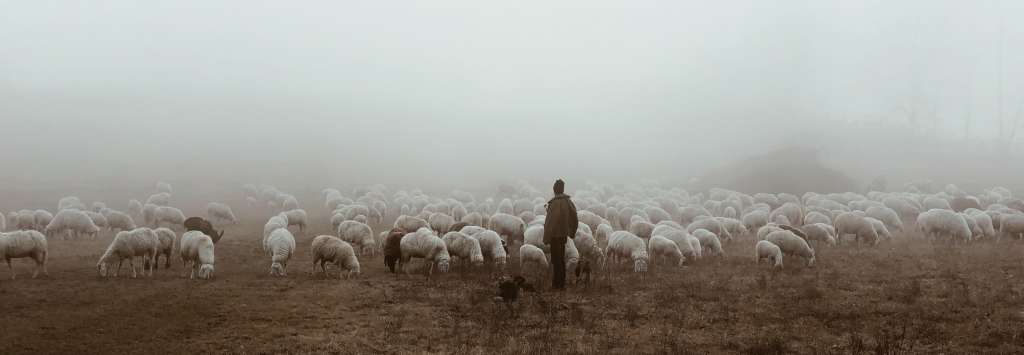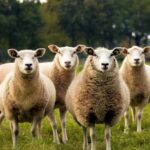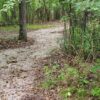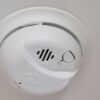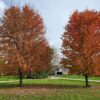I have a secret that I need to tell: I love watching sheep. They are very funny animals. The way they run around in their pen always brings a smile to my face.
A few years back, I was watching a documentary about sheep. It showed this one sheep who somehow managed to wander outside of the pen. The shepherd opened the gate so that the sheep could come back in. But for some reason, she remained outside. He kept calling for the sheep to come back into the safety of the pen, but she just kept ramming herself into the fence. This went on for quite some time. The gate was wide open, but she was determined to find her own way in.
As I prepared for this homily, it dawned on me that you and I actually have a lot in common with sheep. Christian author Max Lucado asks a very interesting question in one of his books. He writes, “Couldn’t God have thought of something better to compare us to instead of sheep? Of all God’s animals, the sheep is probably the least able to take care of himself. They are kind of helpless.”
Yet, God compares us to sheep more than any other animal in scripture. Why is that? There are five similarities that may surprise you, especially in relation to today’s readings.
- Sheep often wander away from the flock. Sheep are directionless; therefore, they need a gate. That’s why it was very common for the shepherd to sleep at the entrance where the gate was located. Much of the time there was no gate, so the shepherd actually became the gate. He would lie across the entrance to the sheep pen so that no one could come in and steal the sheep and the sheep could not come out unless they went through the shepherd. So when Jesus says he is the gate for the sheep, he is using the image of a shepherd, not like a door as a protective barrier, but as a passageway.
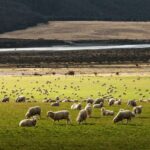 Jesus says, “Whoever enters through me will be saved, and will come in and go out and find pasture.” The “come in and go out” refers to the quality of life we experience through Christ. “Coming in” refers to the safety that the sheep encounter as they enter the sheep pen for the night. “Going out” refers to the sustenance that the sheep receive as they go out to the pasture during the day. You and I cannot understand the safety of the sheep pen unless we “come in” through the gate. And you and I cannot know the goodness of the pasture unless we “go out” through the gate. Jesus IS the gate. When we enter through Jesus, our lives will be secure, and we will be led to good pasture. This gate is not intended to fence us in or hold us back, but rather prevent us from wandering so we can grow in our relationship with Christ, deepen our faith, and experience more of the abundant life God has provided for us.
Jesus says, “Whoever enters through me will be saved, and will come in and go out and find pasture.” The “come in and go out” refers to the quality of life we experience through Christ. “Coming in” refers to the safety that the sheep encounter as they enter the sheep pen for the night. “Going out” refers to the sustenance that the sheep receive as they go out to the pasture during the day. You and I cannot understand the safety of the sheep pen unless we “come in” through the gate. And you and I cannot know the goodness of the pasture unless we “go out” through the gate. Jesus IS the gate. When we enter through Jesus, our lives will be secure, and we will be led to good pasture. This gate is not intended to fence us in or hold us back, but rather prevent us from wandering so we can grow in our relationship with Christ, deepen our faith, and experience more of the abundant life God has provided for us.
- Sheep need constant protection from predators. Sheep are a prey species and their only defense is to flee. Sometimes when we are faced with our own predators – those things or people that provoke us to heightened emotions such as anger, defensiveness, sadness, and guilt just to name a few – we have this fight or flight reaction. We say, “The Lord is my shepherd; there is nothing I shall want…” but then we “want” whatever it is to go away. When we pray this psalm, it doesn’t mean that God is going to take away our suffering, pain, or the threats we may encounter. But we are assured that God is always right there with us, especially when we walk through the dark valley. God will never leave us to face our fears by ourselves, because God’s goodness and kindness will follow us all the days of our lives.
- Sheep cannot get up on their own. If a sheep falls down on its back, it needs the shepherd to lift it up, or it’s stuck where it is. In our 2nd reading, St. Peter tells us that we are to patiently endure suffering in our everyday lives; to surrender our very selves just as Christ suffered and gave of himself. Our suffering servant is our Shepherd who is faithful in watching over his flock. We are weak, often run down and knocked over on our backs by the challenges and struggles of life. That’s why we need the Good Shepherd to lift us up and put us back on our feet.
- Sheep remain dirty until someone cleans them. In our first reading, Peter addresses the “whole house of Israel” upon whom he places the guilt of Jesus’
 crucifixion. They finally realize what they had done and ask, “What are we to do?” Peter tells them to “Repent and be baptized.” But this repentance is not just about being sorry. It is about having a radical conversion of mind and heart. It’s turning away from our sinful ways and becoming one with Christ. That’s what baptism is all about: it’s re-establishing our relationship with Jesus and being the light of Christ to others. It’s washing away our old life and beginning anew. We are washed clean when we turn our lives over to the Good Shepherd.
crucifixion. They finally realize what they had done and ask, “What are we to do?” Peter tells them to “Repent and be baptized.” But this repentance is not just about being sorry. It is about having a radical conversion of mind and heart. It’s turning away from our sinful ways and becoming one with Christ. That’s what baptism is all about: it’s re-establishing our relationship with Jesus and being the light of Christ to others. It’s washing away our old life and beginning anew. We are washed clean when we turn our lives over to the Good Shepherd.
- Sheep know and follow the voice of their shepherd. Sheep have amazing memories and are able to recognize the voice of their shepherd. We too must familiarize ourselves with the voice of Jesus, our Shepherd, in order to hear him calling our own name. But the voice of Jesus is often drowned out by the various thieves and robbers in our lives. Who or what are these thieves and robbers? Is it work? Is it an addiction? Is it wanting to be in control? Coveting what others have? The accumulation of stuff? Conceit, wanting everything to revolve around us? The thief comes to destroy, but Jesus comes to heal and restore. So, who or what has been pulling us away from the voice of Jesus?
One of the reasons why sheep hear and recognize their shepherd’s voice is because the pasture is generally a quiet place. For us, if we want to hear our Shepherd’s voice, we must find time in our daily lives for silence. Whether that’s through prayer, meditation, reading scripture, adoration of the Blessed Sacrament, or simply sitting still when surrounded by nature, we must allow the space for our Shepherd to speak to us.
St. Teresa of Calcutta teaches us the importance of having a daily practice of silence. She wrote:
We need to find God, and He cannot be found in noise and restlessness. God is the friend of silence. See how nature – trees, flowers, grass – grows in silence; see the stars, the moon and sun, how they move in silence. …The more we receive in silent prayer, the more we can give in our active life. We need silence to be able to touch souls. The essential thing is not what we say, but what God says to us and through us.
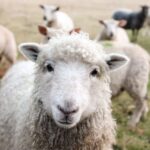 My sisters and brothers, we need to stop stubbornly ramming our heads against the fence trying to find our own way in. We are being welcomed by the Lord into his pasture, and he does so by calling each one of us by name into the sheepfold. Jesus offers us an abundant life, a life filled with meaning and purpose. That doesn’t mean it will always be easy or trouble free. But Jesus will be with us every step of the way leading us to something better. All we have to do is enter through the gate.
My sisters and brothers, we need to stop stubbornly ramming our heads against the fence trying to find our own way in. We are being welcomed by the Lord into his pasture, and he does so by calling each one of us by name into the sheepfold. Jesus offers us an abundant life, a life filled with meaning and purpose. That doesn’t mean it will always be easy or trouble free. But Jesus will be with us every step of the way leading us to something better. All we have to do is enter through the gate.
How do we recognize the voice of the Shepherd? Find out here.

